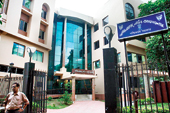 |
| The Natya Akademi building. (Bishwarup Dutta) |
Paschimbanga Natya Akademi was founded on September 26, 1987, as an organisation under the state department of information and cultural affairs to develop and showcase theatre from Bengal.
The Akademi was to regulate the functioning of the theatre halls established by the Left government: Girish Mancha, Madhusudan Mancha and Ahindra Mancha.
It was to decide the annual awards given by the government for production and acting and the Dinabandhu award for contribution to theatre.
The organisation produced plays and brought out publications. A new chapter started when the Natya Akademi Bhavan was inaugurated at 1/1 AJC Bose Road (next to Nehru Children’s Museum) on March 6, 2007.
Built at Rs 1.08 crore, the three-storeyed building gave rise to great expectations. It came with an intimate theatre space named Tripti Mitra Sabhagar, a large room for rehearsals and workshops, guest rooms, a conference area and space for an archive and library.
Its duties expanded to hosting festivals and shows in Bengal, organising workshops, seminars, lectures, publication of new books on theatre and preserving archival material. Its role in spreading awareness about the need for theatre training and appreciation even in distant villages was commendable.
But over the years, like many cultural institutions during the Left rule, it acquired a certain notoriety as a front for the Front.
Who controlled it during the Left regime?
It was alleged that the awards, financial support and berths at festivals were given away at the behest of the Front. The constant presence of representatives of Left groups like Ganatantrik Kala Kushali Sangha, Ganatantrik Lekhak Sangha and Gana Natya Sangha coloured all decisions of the organisation. The Natya Utsabs were allegedly conducted to “keep the flock together”.
What were its high and low points down the years?
High: Natya Akademi Bhavan inaugurated on March 6, 2007.
Low: In 2007, Natya Akademi was unable to hold its annual Natya Mela in November following the Nandigram killings. Many of its executive committee members, such as Manoj Mitra, Bibhas Chakraborty and Kaushik Sen had resigned.
What are the primary challenges the organisation faces today?
Funds: The annual layout of around Rs 28 lakh is said to be insufficient, though there are allegations of misuse of funds. Many suggest the organisation should be made autonomous.
Commitment: Serious work is needed to build this into a theatre hub that will showcase and link the theatre of Bengal to the rest of the world. The official website has not been updated since 2007. There is still no sign of an archive promised in 2007 and the rare documents and audio-video CDs and DVDs are merely stacked in piles. The last time books were bought for the library was before 2006-7. Many of the collection of 2,375 books are from private donations by Sarajubala Devi, Debnarayan Gupta, Jawhar Roy and Digindrachandra Bandyopadhyay.
The library has no photocopying machine, no web or digital support of any kind. Though there are no charges, the weekly footfall rarely crosses one or two. The facilities of guest rooms, seminar space and Tripti Mitra Sabhagar need to be publicised.
Publications: Akademi publications should be regularised and screened for true value. There should be a sales counter on the Bhavan premises.
Access: The approach to the Natya Akademi Bhavan calls for some cleaning. Now one has the choice of stepping over sewage or garbage.
Staff: The Natya Akademi Bhavan is short-staffed with only 12 employees. One person mans the archive and the library.
Metro talks to Manoj Mitra, playwright and theatre director-actor who has been appointed president of Natya Akademi
Q: You have headed the Rabindra Bharati drama department for several years, holding the Sisir Bhaduri chair, written over 90 plays and are a highly regarded actor-director. To many your appointment as president of Natya Akademi was
long overdue... your reactions.
A: It is a great pleasure. I have been working for theatre all my life and this gives me a chance to do something on a bigger scale. I am sure it will be a great experience to work with everyone.
Q: Over the years Natya Akademi became famous as a centre for party favouritism... you had dissociated yourself from it in 1996 and resigned after the Nandigram killings in 2007. How do you see the future?
A: I believe we have a lot to look forward to. The chief minister called me soon after I had received the letter and one of the first things she said was that she was leaving the good of theatre entirely to us. She said: “I have absolute faith in your discretion and judgement and the government will assist you in every way possible, but there will be no state interference, no directives.” These are precious words because all theatre practitioners prefer to work freely.
Q: What plans do you have?
A: Well, I can’t say anything right now. I will be meeting the committee members soon and only after I exchange ideas with the senior and junior members and the Akademi staff can I decide. But the Natya Akademi holds a lot of promise and only a fraction of its capacity has been explored.
Sebanti Sarkar











